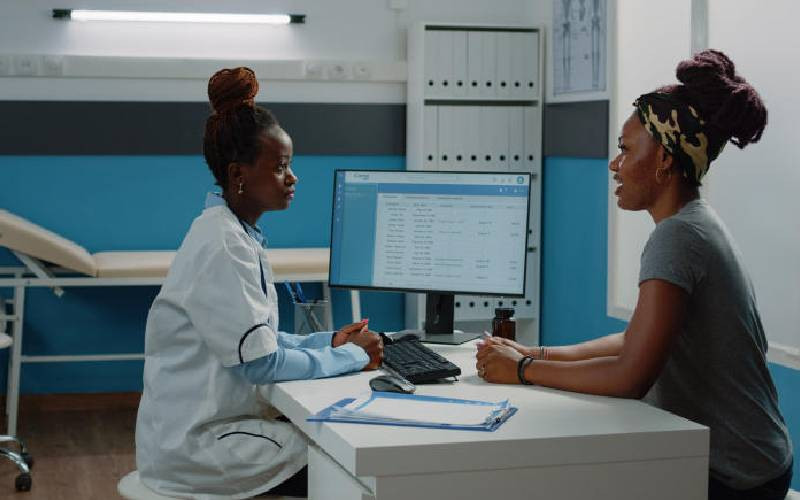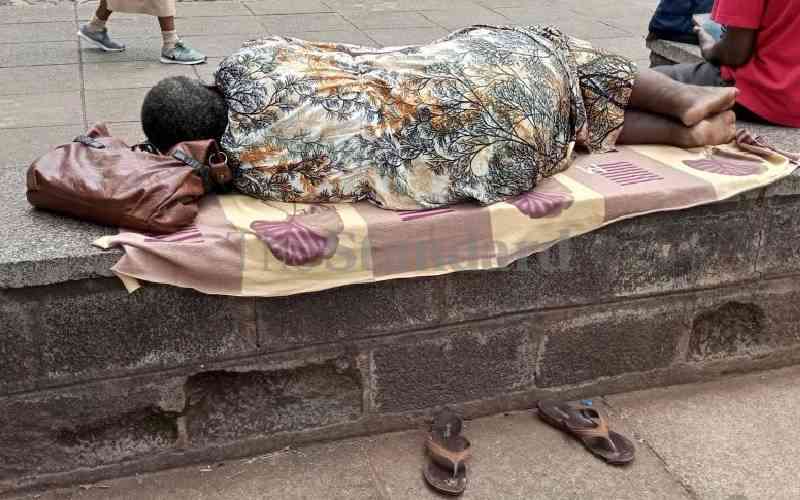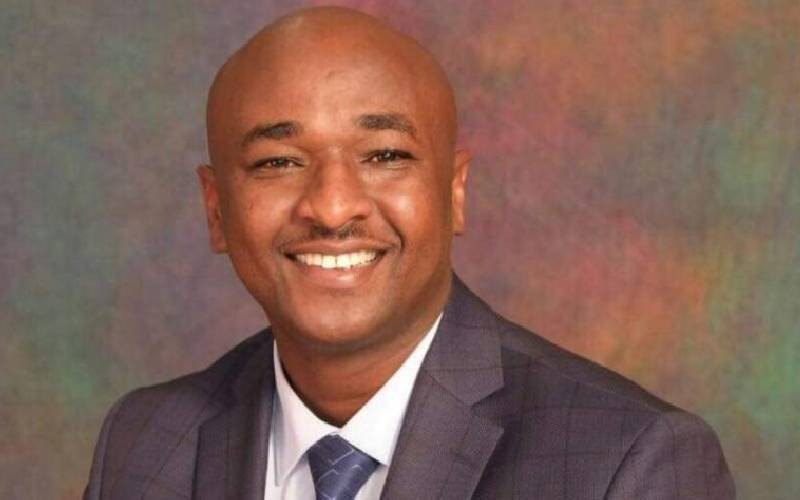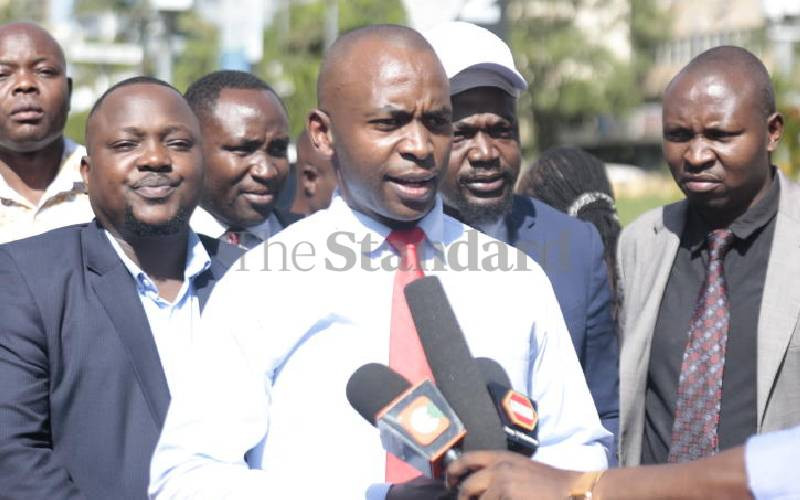 |
|
Kimbilio Hospital Clinical Director Rachael Odoto talks to cancer patients and their relatives at the hospital in Uasin Gishu County recently. The hospital and The Standard Group, held a marathon last weekend to raise money for cancer patients. [PHOTO: PETER OCHIENG’/STANDARD ] |
By Frankline Sunday
KENYA: Although it’s been more than 11-years, Carole Njagi, now 38, recalls the day she was diagnosed with breast cancer vividly.
She had been breastfeeding her new-born son at her home in Embu when she felt a mysterious lump in her right breast.
She went to the hospital where the doctor did an open biopsy on her breast in order to conduct tests on the underlying tissue, which later on turned out to be a near fatal error.
Two-weeks later, the results came and the doctor told her that she had breast cancer and by this time the lump had grown big and was conspicuous.
“The first thing I told him was, ‘I know about cancer and I know it’s a terminal disease so give it to me straight, how much time do I have left?’” Ms Njagi recalls.
The doctor told her that since the cancer had been caught early, she had a high chance of fighting it and she need not think that she was doomed.
What the doctor failed to tell her, however, was that he had made a mistake by making an incision in the tumour, which accelerated its growth and eventual spread to her entire right breast.
“I went to Kenyatta National Hospital, where I was informed that the tumour had spread because of the open biopsy and my only hope was a complete mastectomy,” she recalls.
After the surgery that saw Carole lose her entire right breast, she was placed in line and was told to wait for eight-months for her turn to start chemotherapy.
“I couldn’t wait for eight-months because the tumour had spread to my entire breast in less than a month and I was afraid of what would happen if I waited any longer,” she recalls. Luckily for Carole, she was moved up the list and managed to get her treatment in less than three-months.
The months that followed were, however, most difficult for the young mother. Her husband left her, she lost her job and had to rely on the good will of relatives to raise over Sh500, 000 needed for the treatment.
Her illness led to her being treated like an outcast, with neighbours saying she was bewitched especially after the chemotherapy saw her lose all her hair and put on weight twice her size.
Five long and harrowing years later, she underwent a battery of tests and was declared free of cancer; the treatment had worked and Carole had kicked cancer in the backside.
Carole’s case inspires many cancer patients in her home town of Embu and here in Nairobi where she attends monthly breast cancer support group meetings.
Stay informed. Subscribe to our newsletter
However, due to the high level of morbidity of the disease, few cancer patients are as lucky.
Painful journey
11-year-old Meshack Kimutuni is just beginning a long, uncertain and painful journey, one that his young age does not allow him to fully understand.
Two-years-ago, Meshack started complaining to his parents of searing back pains that would later render him immobile. His father, Roberto Kimutuni, took him to the nearest health centre where they were given some pain medication and discharged.
But even after the taking the medication, the pain persisted, and this time Meshack’s left hand had become rigid from the pain. The family made several trips to health centres in Bungoma and with every visit, Meshack’s pain shifted to a different part of his body, with the pain growing in tandem with his parents’ anxiety.
“We went in and out of hospitals in Bungoma for almost a year and each time we took him to a hospital, they would examine him and say that they had found nothing wrong with him,” explains a distraught Kimutuni.
Eventually, the family was referred to the Moi Teaching and Referral Hospital where Meshack was diagnosed with childhood acute lymphoblastic leukaemia, a cancer of the blood and bone marrow.
The family’s long journey ended at the paediatric cancer ward at the Kenyatta National Hospital where Meshack is currently admitted and is receiving treatment. His parents are poor and cannot afford to stay in Nairobi with their son so they have to commute every so often from their home in Bungoma.
His father, himself a TB patient, finds travelling a physical and financial burden, and it has been several months since he last saw his ailing son.
For Mr Joseph Omach, a programme officer at the Childhood Cancer Initiative (CCI), Meshack’s case though unfortunate, is not uncommon.
“Children react differently to cancer than adults and because they do not know how to properly describe what is ailing them, most cases of childhood cancer are caught in advanced stages particularly when the family is poor,” he explains.
CCI is a non-governmental trust that deals with childhood victims of cancer in the country, an aspect that Mr Omach states has been overlooked.
“We often forget that children also suffer from cancer partly because there are not that many cases compared to adult cancers.”
The common thread that cuts across the cases of both Carole and Meshack, however, is that they were diagnosed at a poorly equipped government facility and the misdiagnosis delayed the onset of their treatment.
The importance of early diagnosis, particularly for breast, cervical, prostrate, skin and oral cavity cancers cannot be over-emphasised.
However, seven out of ten cancer patients get diagnosed too late when the cancer is at an advanced stage and often incurable. This is mostly because the Government lacks important resources and personnel particularly at county health centres.
The Kenyatta National Hospital (KNH) is the only public facility that caters to cancer patients across the country at subsidised fees. A performance audit report conducted on the facility by the office of the Auditor-General in November last year revealed glaring deficiencies at the referral hospital.
It takes thrice as long as it should to get test results back from the histology lab and patients at the hospital’s Cancer Treatment Centre often have to wait for an average of 63 days just to see a clinical specialist for the first time.
Long wait
Patients booked for radiotherapy sessions wait for an average of four-months before they attend the first session, while those due for chemotherapy wait for one and a half months.
Cervical cancer patients lined up for treatment normally stay in the queue for an average of five-months before they access treatment services for the first time.
Even after a patient has endured the long wait, one is not guaranteed treatment on schedule, with one in two patients failing to receive chemotherapy as booked.
For those who can afford it, private hospitals like MP Shah, Aga Khan and the Nairobi Hospital are alternatives where queues are much shorter but the price significantly higher.
 The Standard Group Plc is a
multi-media organization with investments in media platforms spanning newspaper
print operations, television, radio broadcasting, digital and online services. The
Standard Group is recognized as a leading multi-media house in Kenya with a key
influence in matters of national and international interest.
The Standard Group Plc is a
multi-media organization with investments in media platforms spanning newspaper
print operations, television, radio broadcasting, digital and online services. The
Standard Group is recognized as a leading multi-media house in Kenya with a key
influence in matters of national and international interest.
 The Standard Group Plc is a
multi-media organization with investments in media platforms spanning newspaper
print operations, television, radio broadcasting, digital and online services. The
Standard Group is recognized as a leading multi-media house in Kenya with a key
influence in matters of national and international interest.
The Standard Group Plc is a
multi-media organization with investments in media platforms spanning newspaper
print operations, television, radio broadcasting, digital and online services. The
Standard Group is recognized as a leading multi-media house in Kenya with a key
influence in matters of national and international interest.










